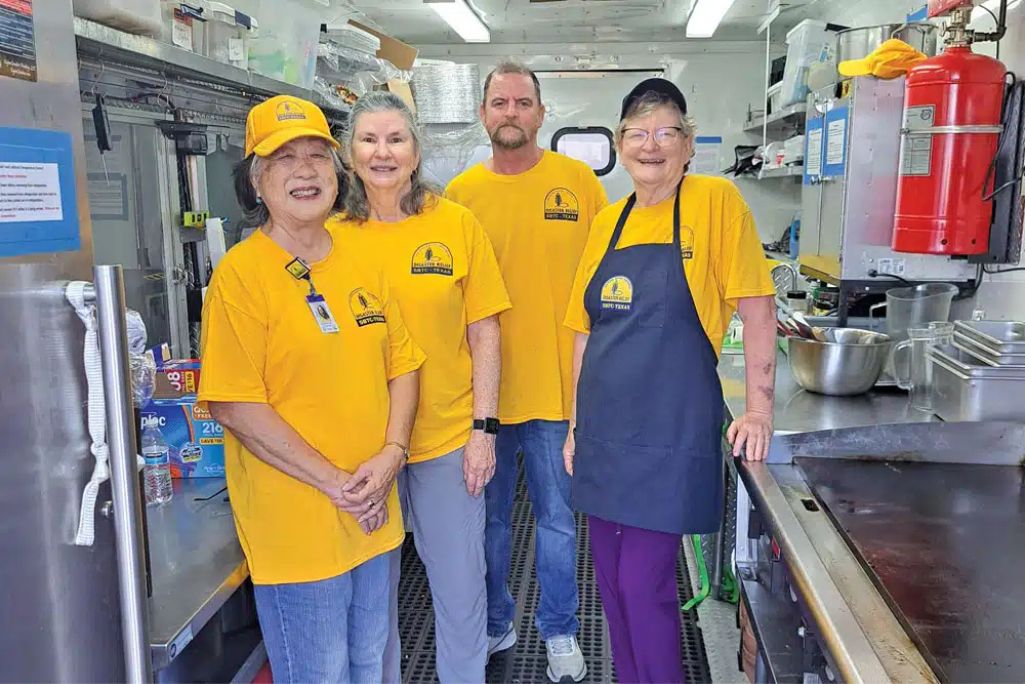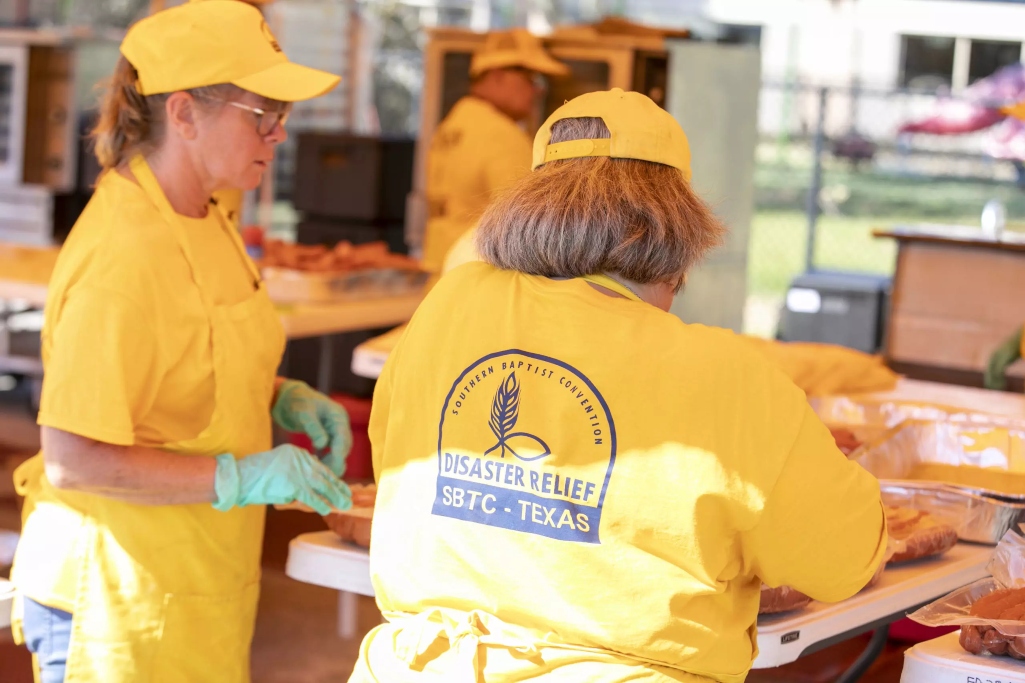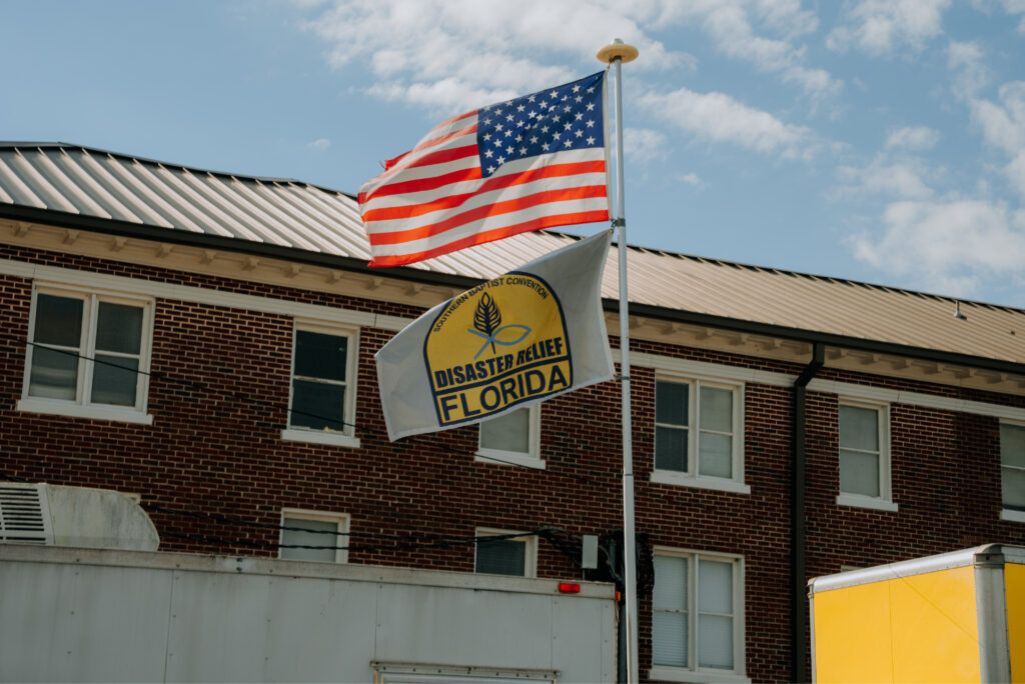
Sandy Dunnuck is seen at far right inside a SBTC DR response kitchen unit housed at Spring Baptist.
SPRING, Texas — Sandy Dunnuck stays busy.
The 73-year-old works for a food delivery service (“It helps pay the bills and keeps me busy,” she says) and is an active member at Spring Baptist Church, which she has attended since moving to the area from El Paso in 1994 with her two sons following a difficult divorce. She chose Spring to be near parents and other family members.
“Spring was as far as I could get from El Paso without leaving Texas,” she recalled, smiling. Her parents and relatives all went to Spring Baptist, so joining the church was an easy decision amid many difficult ones.
“Both my parents are in heaven now, as is my brother. It’s down to my sons, grandkids, great-grandchildren, and a sister who lives in Corpus,” Dunnuck said.
No matter. Spring is home.
Dunnuck always wanted to work with teenagers. She spent a career doing just that, but not as she expected.
Work with troubled teens
Her lifelong dream of working with teenagers — she taught teens in Sunday school in El Paso — came to fruition in Spring as well, albeit via an unusual professional track. With a bachelor’s degree in criminal justice, she embarked upon a career in juvenile probation in Montgomery County.
“And I loved it,” Dunnuck said.
Eventually, Dunnuck said she “got the bug to be a therapist.” She earned a master’s degree in counseling in 2000 and accumulated 24 hours toward a Ph.D. in juvenile justice when she got tired of school and opted to become a licensed professional counselor. She also became an LSOTP: licensed sex offender treatment provider.
“In all my work with juvenile probation, I always ended up working with the sex offenders in one role or another, no matter what I did,” Dunnuck said. Following 16 years in juvenile justice, she retired from probation but continued doing contract work for the system via her private counseling practice for a decade.
Dunnuck said she chose to work with juveniles and their families because of the potential for reform.
“You can do so much [to help] juveniles,” she said, praising the innovations and hard work done in Montgomery County. She conducted parent and juvenile groups.
“I loved working with the parents,” she said. “Most of them were doing the best they could with what they had. They were so grateful to be able to talk with somebody to deal with that stuff. I never went into parent shaming,” she added.
Dunnuck learned a lot in her years working with juvenile offenders.
“You learn you have to have a good sense of humor,” she said. “It can be hard to understand why the kids do what they do.” Her faith, she added, gave her discernment. She shared her beliefs in subtle, constructive ways. She prayed privately for the young people she counseled.
Occasionally, she could be direct about the Lord. One teen confided to her that he was confused about his sexuality, believed that behavior to be a sin, and thought he would never feel normal.
“Don’t paint yourself into a box that you cannot get out of,” Dunnuck told him. “God can change people.” She admitted she thinks about that young man with so much potential even today.
“I am hoping and praying he found the truth,” she said.
A changed life
Dunnuck knows about change. She is a changed person herself.
“I grew up in church. When the doors were open, we were there. Mom was a Sunday school teacher and Dad was a deacon. At eight, I accepted Christ as my Savior,” she said.
“I wish I could say I was always faithful in my walk. That would be a lie. I was not very faithful to God for a period. I fell … way too many times. My biggest concern was that God could never use me again,” Dunnuck continued.
Perhaps this recognition of her own shortcomings motivated her to work with young people on the fringes.
“God used even the bad choices I made to enable me to be able to work with kids and families who were making bad choices in a non-judgmental, non-self-righteous way,” she said. “I cannot judge anybody.”
These days, Dunnuck serves the Lord in numerous ways. She is Spring Baptist’s orchestra pianist and orchestra librarian, joking, “They keep me on as pianist because nobody wants to be the librarian.” She also plays piano for the senior choir, doing so since she was in her 50s—then technically too young for the group.
After Hurricane Harvey hit Houston in 2017 and Spring Baptist housed Southern Baptist Disaster Relief (SBDR) volunteers from Oklahoma, she became active in Southern Baptists of Texas Convention (SBTC) DR. As a credentialed SBTC DR volunteer, she has deployed to El Paso for a border crisis and Louisiana following hurricanes. She serves as the lead on the quick response kitchen unit housed at the church. Mark Estep, Spring Baptist’s senior pastor, calls Dunnuck “a wonderful servant of God.”
“My testimony is not that I was saved from the gutter, but that I was forgiven,” Dunnuck said. “God can use the bad choices that you made. I can relate to the people in trouble.”


